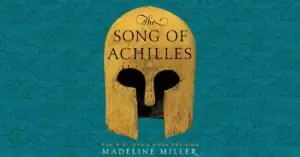Looking for The Book Thief by Markus Zusak summary for you class? The Book Thief is a historical novel set in Nazi Germany during World War II, narrated by Death. This original perspective allows the story to observe the harsh realities of war, the complexities of human nature, and the influence of words on personal and collective experiences. The novel follows Liesel Meminger, a young girl who discovers a love for books in the turmoil of war. Through Liesel’s journey, Markus Zusak offers a poignant exploration of life, mortality, and the power of stories.

✅ AI Essay Writer ✅ AI Detector ✅ Plagchecker ✅ Paraphraser
✅ Summarizer ✅ Citation Generator
| 📚 Title | The Book Thief |
| ✍️ Author | Markus Zusak |
| 📆 Published | 2005 |
The Book Thief Summary of The Plot
The story begins with Liesel Meminger’s arrival at her foster parents’ home, Hans and Rosa Hubermann, in the small town of Molching. After the death of her younger brother and separation from her mother, Liesel is left deeply affected. In her grief, she steals her first book, The Gravedigger’s Handbook, from her brother’s burial site, sparking her fascination with literature. Hans, her kind-hearted foster father, teaches Liesel to read, and she quickly becomes amazed with books, often taking them when she can. Her passion for reading provides her with an escape from the brutalities of the world around her. Meanwhile, the Hubermanns harbor a Jewish man named Max Vandenburg in their basement, further endangering their already tenuous safety under the Nazi regime.

As Liesel matures, the war becomes increasingly severe. She forms a strong connection with Max, who shares his own story with her through words and drawings. Together, they find comfort in storytelling, creating a bond that sustains them through the darkest times. Throughout the novel, Liesel’s theft of books serves as a form of resistance against the oppressive environment in which she lives. Each stolen book represents a new chapter in her life, marking her growth and the relationships she forms. Death, as the narrator, offers insights into the fragility of life, the pain of loss, and the moments of beauty that persist even in the bleakest circumstances.
In the end, The Book Thief is a story of resilience, the transformative power of words, and the connections that can form even in the most difficult of times. Through Liesel’s eyes, readers are reminded of the impact that stories can have on our lives, offering hope and solace in the face of unimaginable hardship.
The Book Thief Book Summary: Main Characters and Their Roles
In the summary of The Book Thief there are several key characters present. If you haven’t read the book, they might seem confusing, so here is a short list of the people (and creatures) mentioned above.
Liesel Meminger
Liesel is the heart of The Book Thief. As a young girl growing up in Nazi Germany, she faces immense hardship, from losing her brother to being separated from her mother. Despite these challenges, Liesel’s love for books and words becomes her way of making sense of the world. Her journey from an illiterate girl to an avid reader mirrors her growth and resilience in the face of adversity. Liesel’s character embodies the theme of the transformative power of words. Each book she steals represents not just an act of rebellion, but also a step towards understanding and coping with the chaos around her. Liesel’s relationships with other characters, like Hans, Rosa, and Max, show her capacity for love and empathy, even in a world filled with hatred.

Hans Hubermann
Hans, Liesel’s foster father, is a gentle and kind-hearted man who provides a stable and loving home for Liesel. He is patient, teaching Liesel to read and nurturing her love for books. Hans’ character represents the idea of quiet resistance; he hides a Jewish man, Max, in his basement, risking his life to stand against the Nazi regime. Hans’ actions reflect the theme of moral courage—doing what is right, even when it is dangerous. His relationship with Liesel is central to the novel, as he becomes her anchor, providing comfort and safety amidst the turmoil of war.
Rosa Hubermann
Rosa, Liesel’s foster mother, is tough and strict, often using harsh words and actions. However, beneath her stern exterior lies a deep love for her family. Rosa’s character demonstrates the different ways people cope with fear and stress; her harshness is a shield against the dangers they face. As the story progresses, Rosa’s softer side emerges, especially in her care for Max and her quiet support of Liesel’s love for books. Rosa’s character adds depth to the theme of familial love, showing that love can be expressed in many different forms.
Max Vandenburg
Max is a Jewish man hiding from the Nazis in the Hubermanns’ basement. His relationship with Liesel is one of the most profound in the novel. Like Liesel, Max uses words as a means of survival, writing stories and sharing them with her. Their bond is built on shared experiences of loss, fear, and the need for hope. Max’s character represents the theme of the human spirit’s resilience. Despite the horrors he faces, Max never loses his will to survive and his capacity to connect with others. His presence in Liesel’s life teaches her about the importance of compassion and the strength found in friendship.

Death
The narrator of the story, Death, is one of the most unique characters in literature. Rather than being a fearsome or sinister figure, Death is portrayed as weary and thoughtful, burdened by the countless souls it must carry away during the war. Death’s narrative voice adds a layer of reflection and philosophical insight to the story. It often comments on the absurdity of war and the fragility of human life, underscoring the novel’s themes of mortality and the fleeting nature of existence. Through Death’s eyes, readers gain a broader perspective on the events of the story, making the moments of beauty and kindness stand out even more against the backdrop of destruction.
These characters, each with their distinct personalities and roles, bring to life the central themes of The Book Thief: the power of words, the impact of love and kindness, and the resilience of the human spirit in the darkest of times.
FAQ
Follow us on Reddit for more insights and updates.





Comments (0)
Welcome to A*Help comments!
We’re all about debate and discussion at A*Help.
We value the diverse opinions of users, so you may find points of view that you don’t agree with. And that’s cool. However, there are certain things we’re not OK with: attempts to manipulate our data in any way, for example, or the posting of discriminative, offensive, hateful, or disparaging material.